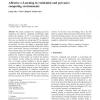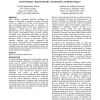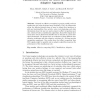7
posts
with
1514
views
1514
views
IJSE
2010
13 years 1 months ago
2010
Affective computing has proven to be a viable field of research comprised of a large number of multidisciplinary researchers resulting in work that is widely published. The majori...
IJMMS
2007
13 years 4 months ago
2007
How we design and evaluate for emotions depends crucially on what we take emotions to be. In affective computing, affect is often taken to be another kind of information - discret...
JCIT
2008
13 years 4 months ago
2008
Affective computing systems are software systems that take in account the emotional state of the user during their operation. Recently it is increasingly accepted that combining e...
ISF
2008
13 years 4 months ago
2008
This article examines how emerging pervasive computing and affective computing technologies might enhance the adoption of ICT in e-Learning which takes place in the home and wider ...
CISSE
2008
Springer
13 years 5 months ago
2008
Springer
— Human centred services are increasingly common in the market of mobile devices. However, affective aware services are still scarce. In turn, the recognition of secondary emotio...
AAAI
2004
13 years 5 months ago
2004
Members of multi-robot teams may need to collaborate to accomplish a task due to differences in capabilities. This paper describes an extension of the ALLIANCE architecture that e...
CRITICAL
2005
13 years 6 months ago
2005
While affective computing explicitly challenges the primacy of rationality in cognitivist accounts of human activity, at a deeper level it relies on and reproduces the same inform...
AUSAI
2009
Springer
13 years 8 months ago
2009
Springer
Research on affective computing is growing rapidly and new applications are being developed more frequently. They use information about the affective/mental states of users to adap...
DSVIS
2003
Springer
13 years 9 months ago
2003
Springer
Research has created many new generation (post-WIMP) Interaction styles (IS) in the past years. From Ubiquitous to Affective Computing, researchers have not kept a uniform standard...






